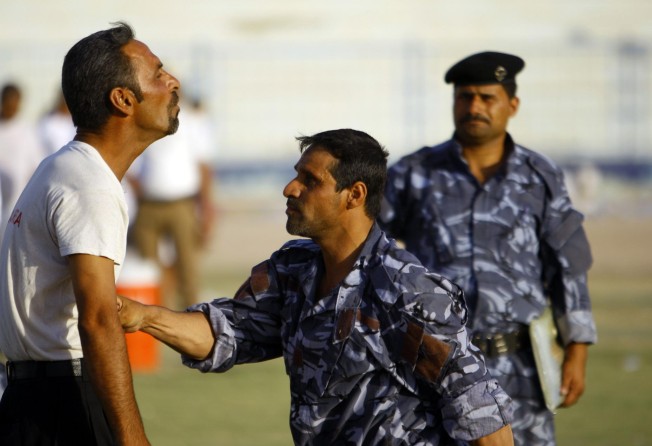
Iraqi army in 'psychological collapse' as ISIL advances, US expert says
Analyst describes 'psychological collapse' in the face of the ISIL offensive

The 300 US advisers authorised to assist the Iraqi security forces will find an army in crisis mode, one so lacking in needed equipment and shaken by desertions that it may not be able to win back significant chunks of territory from al-Qaeda renegades for months or even years, analysts and officials say.

The desperation has reached such a level that President Nouri al-Maliki is relying on volunteers, who are in some cases receiving as little as a week's military training, to protect his ever-shrinking orbit of control.
"Over time, what's occurred is that the Iraqi army has no ability to defend itself," said Rick Brennan, a Rand Corporation analyst and former adviser to US forces in Iraq. "If we're unable to find ways to make a meaningful difference to the Iraqi army as they fight this, I think what we're looking at is the beginning of the disintegration of the state of Iraq."
Even before tens of thousands of troops disappeared into the night two weeks ago, Iraqi generals had complained that they were outgunned by an enemy hardened by years of fighting in Syria and in possession of more advanced weaponry. In recent weeks, ISIL has seized hundreds of millions of dollars' worth of military equipment from the Iraqi army, much of which has been smuggled across the border to Syria, according to Iraqi officials. The frontier is now largely in the hands of ISIL, which seeks to create an Islamic caliphate stretching across Syria and Iraq.
Lieutenant General Rasheed Fleih, head of the Anbar Operations Command, in the critical western province bordering Syria, put on a stoic front on Sunday, claiming in a televised statement that "security forces are reviving" and that volunteers are being deployed to the area. But the addition of tens of thousands of volunteers to the security forces has been chaotic. Many are joining under the banners of militias, though Maan argued they won't be able to function as such.
When they signed up, they would be given a "week or less" of training and be deployed where they were needed, he said.
"The basic problem with the Iraqi military is that it's a sectarian force," said James Jeffrey, a former US ambassador to Iraq. "That's combined with the fact that you have sycophantic generals, you have low morale and a Shiite volunteer force. They didn't do very much training. They don't have the equipment or skills of the [ISIL] guys."
With Iraq's armed forces in a shambles, only with substantial outside assistance will Baghdad be able to turn the tide of the war, analysts and officials say.
Iraqi officials say their needs are wide-ranging and start with US air strikes. Hamid al-Maliki, an air force commander, said intelligence-sharing had improved as the US government had increased surveillance and reconnaissance. Ten surveillance drones were expected to be delivered in the next 10 days, he said.
The army is attempting to regroup, though it will probably take years to restructure. Troops and police officers who have sought to return to the security forces are quietly being organised on the border of Iraq's Kurdish region, said Maan and Maliki.
And some of the soldiers who abandoned their posts are returning to the military.
One soldier, Bassil Hassan, said he wept as he abandoned his Kirkuk base in the face of a Sunni assault and was desperate to redeem himself. "I've been in the army for five years, and I've never withdrawn without a fight," said Hassan, clamouring for a ticket on a plane back to Baghdad to rejoin his unit. "Before we left, we were weeping. We feel so ashamed, because we didn't fight. We were defeated without firing a single shot."
He says soldiers in his unit began deserting individually after the northern city of Mosul fell.
Then his commander summoned the troops and said they could leave if they wanted.
"Then 10 minutes later he came back and said there's an order from Baghdad to leave, put on civilian clothes and go back to your families," Hassan said.
Additional reporting by Agence France-Presse